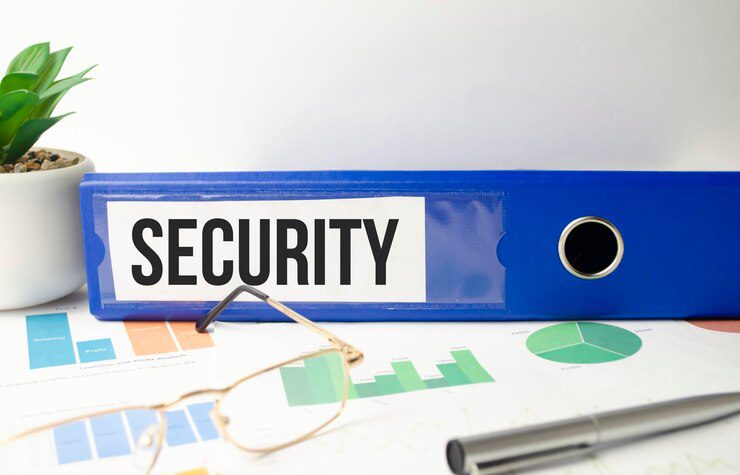Hey there, Startup Ninjas! Are you ready to learn some super important stuff about keeping your business safe? At InsiderBlog.co.uk, we’re like superheroes for businesses, and we’re here to help you protect your awesome dreams!
We know you’ve been working super hard to build your business, and we want to make sure nothing bad happens to it. That’s why we’re going to share some business security tips with you. These tips are like a secret code to keep your business safe from danger.


Just like you lock your bike with a key so no one can take it, you need to lock up your business information so no one can steal it. And just like you wear a helmet when you ride your bike to protect your head, you need to protect your business from things like storms and bad guys.
So, grab your superhero cape, Startup Ninjas, and get ready to learn how to keep your business safe! We’re here to help you every step of the way.
The Big Business Security Secrets!
- Keep your stuff safe! Just like you lock your toys in a toy box, you need to lock up your business information so no one can steal it.
- Be ready for anything! Even if a storm comes or bad guys try to break in, you need to have a plan to keep your business safe.
- Teach your team to be superheroes! Everyone who works with you needs to know how to keep the business safe. It’s like having a whole team of superheroes!
- Don’t forget to update your gadgets! Just like you update your video games, you need to update your computer programs to keep them safe from bad guys.
- Make copies of your important stuff! Just like you have a spare key for your house, you need to have copies of your important business information just in case something happens.
- Use strong passwords! Don’t use your birthday or your pet’s name. Make a password that’s like a secret code only you know!
- Choose a safe and strong platform! Just like you build a strong fort to protect your toys, you need to build your website on a strong platform that can keep it safe.
Safeguarding Your Dreams: The Necessity of Business Security
As an entrepreneur, your dreams drive your business. But, every business faces many risks. These risks can harm your business, like natural disasters or cyber attacks.
“The only truly secure system is one that is powered off, cast in a block of concrete and sealed in a lead-lined room with armed guards – and even then I have my doubts.” – Gene Spafford
It’s important to protect your business. This means using strong business security to keep your dreams safe. By taking steps to prevent risks, you can protect your assets and keep your business strong.
- A survey found that 90% of cyber breaches are caused by human mistakes. This shows how important it is to train employees to keep data safe.
- Only 43% of small businesses have a cybersecurity plan. This shows a big need for more security among small business owners.
- Cyberattacks cost small businesses about $200,000 on average. This can hurt a business’s ability to keep going.
Ignoring business security can be very bad. Research says 60% of small businesses that get hacked go out of business in six months. It’s time to take action to protect your business.
Business Security Tips: Preventing Weather and Natural Disasters


Extreme weather and natural disasters can harm businesses. They can damage buildings, stop work, and lose important data. To keep your business safe, you need to act early. Here are some key tips to help you stay safe.
Comprehensive Insurance Coverage
Work with a local, independent insurance agent. Make sure your insurance covers your business’s risks. Good policies protect against damage, stopping work, and losing data.
Developing an Emergency Plan
Make a detailed emergency plan. It should cover how to leave, how to talk to each other, and how to get back to work. Check this plan often to make sure your team is ready.
Protecting Your Structure
Put in storm shutters or new windows to protect your building. Also, keep outdoor stuff safe and check your building for weak spots.
Backing Up Critical Data
Back up your important data often. Keep copies somewhere else, like in the cloud. This way, you can get back to work fast if disaster strikes.
Using these tips can help you get ready for natural disasters. It keeps your business running and your data and buildings safe. Being ready is the best way to protect your business.
Prioritizing Employee Health and Safety
Keeping your employees safe is very important. It’s not just the right thing to do. It also helps your business stay strong. Make sure your team has the right gear for their jobs and teach them how to use it.
Encourage everyone to help keep the workplace safe. This means telling you about dangers, keeping areas clean, and watching out for each other.
Providing Personal Protective Equipment
Studies show 75% of companies think employees will ask for more safety help soon. Make sure your team has the right PPE, like goggles and gloves. Check often to see if everyone is following the rules.
Maintaining a Safe Workspace
Having programs for wellness and counseling can make your team work better. It also helps stop burnout. Always check and update your safety plans to stay ready for new dangers.
Teach your team how to handle emergencies and talk about mental health. This makes your workplace safer for everyone.
Being Weather-Aware
Good communication builds trust. It lets employees share worries and give feedback. Leaders must really care about keeping everyone safe.
They need to give enough resources and support for safety. This way, you can keep your team safe during bad weather.
Reputation and Legal Protection Strategies
Keeping your business safe is very important. Know the laws in your field well. Also, check if you follow them often.
Get workers’ compensation to protect your business money-wise and legally. This is if an employee gets hurt or dies.
Have a good online image. Show your company’s true self. Answer any bad comments or reviews well. This shows you care about being honest and fair.
- Check if your company follows the law often to avoid trouble.
- Get workers’ compensation to protect your business money-wise and legally. This is if an employee gets hurt or dies.
- Watch your online image and answer bad feedback quickly and nicely.
- Make sure your business is honest and clear in everything you do.
Focus on keeping your business’s reputation good, following the law, and avoiding risks. This will help your business grow strong and stay safe for a long time.
Fortifying Your Cybersecurity Defenses


In today’s world, cyber threats like data breaches and phishing attacks are big risks. They can hurt your business a lot. To keep safe, you need to follow good cybersecurity steps.
Performing Regular Software Updates
It’s key to keep all software and systems updated. This helps protect your business from cyber dangers. By doing this, you lower the chance of getting hacked.
Conducting Employee Cybersecurity Training
Your team is your first defense against cyber threats. Training them well helps them spot and stop phishing. It also teaches them to keep passwords safe and prevent data breaches.
Implementing Firewall and Antivirus Systems
Firewalls and antivirus systems are vital for network and data safety. They help block malware and ransomware. This makes your network more secure.
Business Security Tips: Preparing for the Future
Even the best plans can change. Things like economic downturns or life events can hit hard. To keep your business safe, make a good plan for the future and get life insurance.
Electing a Successor and Securing Business Life Insurance
Finding a good successor is key. Look for someone who can lead well. Make a plan for who will take over and get life insurance for your business.
Consulting Your Agent for Future Plans
Talking to your insurance agent often is important. Share your growth plans with them. This way, your insurance can grow with your business.
Establishing Financial Protection
- Save money for emergencies to protect your business.
- Work with a financial planner to keep your finances safe.
- Try different ways to make money to keep your business strong.
By being proactive, you can make your business ready for the future. This way, your business can last long and achieve your dreams. Good business security means planning for the long run, not just now.
Safeguarding Your Website: Essential Security Measures


Your business’s website is very important in today’s world. You need strong security to keep it safe. This includes SSL certificates, web application firewalls, and anti-malware software.
SSL encryption is a key step. It makes sure your website and visitors’ browsers talk safely. This keeps important info, like passwords and payments, safe from hackers.
Web application firewalls (WAFs) are also very important. They protect your site from bad attacks. WAFs watch traffic and keep your site safe from harm.
Anti-malware software is another must-have. It fights off viruses, trojans, and ransomware. Keeping your software updated helps keep your site safe from cyber attacks.
Keeping your website safe is a never-ending job. By focusing on security, you protect your business and customers. This keeps your reputation strong and follows the rules.
Updating Security Plugins: A Crucial Step
As a website owner, keeping your security plugins up to date is very important. Many cybercriminals use old plugins to get into your site. So, it’s key to always update your site’s security.
Updating your site’s security plugins often helps fix problems and stop hackers. Sites like Wix update automatically. This keeps your site safe with the latest security.
Managing software vulnerabilities and updating plugins helps a lot. It keeps your website plugin security strong. This way, you can stay safe from hackers and protect your online stuff.
Implementing SSL Certificates for Enhanced Protection
Keeping your website safe and earning customer trust is key. SSL (Secure Sockets Layer) certificates help a lot. They make sure data like passwords and payments stay safe from bad guys.
It’s important to use SSL certificates on all your website pages. This shows you care about keeping data safe. Also, always check if your SSL certificates are up to date. This keeps your site safe from harm.
- Always-on SSL security is essential for protecting website visitors, as migrating only specific pages to HTTPS can lead to browser marking them as ‘Not Secure’.
- Duplicate private keys or sharing them across multiple servers increases security risks and exposes websites to potential cyber attacks.
- SSL certificates need to be monitored to ensure they do not expire, as they require timely renewal for continuous website security protection.
Using SSL certificates and keeping your security strong helps a lot. It keeps your site’s data safe, builds trust with customers, and protects your business from cyber threats.
Web Application Firewalls: Shielding Against Code Injections
In today’s world, keeping your web apps safe is crucial. Web application firewalls (WAFs) are key tools for this. They block bad code that could harm your business and steal your data.
Code injection attacks, like SQL injection and XSS, are big threats. Hackers use weak spots in your code to sneak in bad scripts. This can steal your data or even take control of your servers. A WAF stops these attacks by blocking bad traffic before it hits your app.
WAFs are great at fighting the OWASP Top 10 threats, including bad code and XSS. They check HTTP traffic and block bad code. This keeps your app and your customers’ info safe.
Choosing a cloud or on-premises WAF can really help your app’s security. A good WAF stops code injection attacks. This protects your business and your customers from harm.
Combating Malware Threats with Anti-Malware Software
Malware is a big problem for businesses. It can cause a lot of trouble if not stopped. Things like Trojan viruses and spyware can harm your systems and steal important data.
A study showed that 92% of security problems came from email malware. This is very scary.
To keep your business safe, make sure your hosting has strong malware scanning. Use firewalls and antivirus programs to find and remove threats fast. Also, tell your employees to update their software and browsers often.
Doing regular security checks and using a zero-trust model helps a lot. Watching for strange activity and limiting access to important systems lowers the risk of malware attacks.
Being careful and always ready is important against malware. Use good antivirus and anti-malware tools and teach your team about security. This way, you can protect your business from malware protection and email security threats.
Two-Factor Authentication: An Extra Layer of Security
Login forms can be weak spots for your business website. Hackers might try to guess your login info. To stop this, using two-factor authentication (2FA) is key to better login security and brute-force attack prevention.
Two-factor authentication means users need a second way to prove who they are. This could be a code sent by text or an app. It makes it tough for hackers to get in, even with a password.
Adding 2FA makes it harder for hackers to get into your systems. It’s great for keeping safe your important info and money. This is very important for keeping your business safe.
More and more, multi-factor authentication is what businesses use to stay safe online. It helps protect your business from hackers. This way, you can keep your business safe and sound.
Business Security Tips: Creating Strong Passwords
Keeping your business safe from cyber threats starts with strong passwords. Weak or reused passwords let hackers in. This is why 81% of data breaches happen because of stolen passwords.
Teach your employees to make passwords that are long and complex. They should be at least 12 characters. Mix letters, numbers, and symbols in a random way.
Don’t use personal info or common words in passwords. They’re easy to guess. Use a password manager to create and keep strong passwords. This helps avoid using the same password for many accounts.
A good password mixes uppercase and lowercase letters, numbers, and symbols. Try to make it at least 14 characters long. By doing this, you can protect your business from password-related cyber attacks.
The Importance of Regular Site Backups
Your website is very important for your business. But, it can still get hacked or lose data by accident. That’s why making regular backups is key. It helps you get your site back fast if something bad happens.
Website backup and recovery are key for business continuity planning. Automatic backups at set times help keep your site safe. They protect your data protection and help avoid big problems.
- About 60% of businesses that lost data without backups went out of business in six months.
- Every day, around 30,000 websites get hacked.
- 93% of businesses that lost their data center for ten days or more went bankrupt within a year.
Keeping your website safe with regular backups is very important. You can use manual, hard drive, or cloud backups. The main thing is to check the backups work well and can be restored fast. By focusing on website backup and recovery, you can feel safe about your online business.
Choosing a Reliable Platform for Robust Security


When you build your business website, picking a secure platform is key. Look for a platform like Wix. It has strong protection, like 24/7 monitoring and an ethical hacker program.
Wix keeps your site safe, so you can grow your business. Their security and services protect your site as your business grows. You can trust Wix to keep your digital stuff safe.
Getting a secure platform is vital for your business. It helps keep your business safe from cyber threats. This lets you focus on making your business grow and succeed.
Wrapping Up Our Business Security Adventure!
Wow, Startup Ninjas! We’ve learned so much about business security tips today. It’s like we’ve been on a super exciting adventure to keep our businesses safe from danger!
We talked about how important it is to keep our information safe, just like we keep our favorite toys in a special box. We also learned how to be ready for anything, even storms or bad guys! And guess what? We even learned how to make our passwords super strong, like a secret code that only we know!
But here’s the most important thing: we need to remember these business security tips every day. It’s like brushing our teeth or eating our vegetables – it’s something we need to do to stay healthy and strong!
At InsiderBlog.co.uk, we want to help you protect your awesome dreams. That’s why we’re always here to give you the best tips and tricks to keep your business safe.
So, what are you waiting for, Startup Ninjas? Go out there and be business superheroes! Protect your dreams, keep your business safe, and have fun while you’re doing it! And don’t forget to share these tips with your friends – let’s make the whole world a safer place for businesses!
Frequently Asked Questions
1. What are business security tips?
Business security tips are like special tricks to keep your business safe. They’re like the rules of a game that help you protect your things and your information from bad guys.
2. Why is business security important?
Business security is important because it keeps your business safe from danger. It’s like wearing a helmet when you ride your bike or putting on sunscreen when you play outside. It protects you from getting hurt!
3. How can I protect my business from bad weather?
You can protect your business from bad weather by having a good plan. It’s like knowing where to go if it rains or having a flashlight if the lights go out. You need to be ready for anything!
4. How can I protect my business from cyber attacks?
You can protect your business from cyber attacks by keeping your computer programs up-to-date and using strong passwords. It’s like locking your front door and keeping the key safe so no one can break in.
5. How can I make sure my employees know about business security?
You can teach your employees about business security by having special training sessions. It’s like teaching them the rules of a game so everyone knows how to play it safe.
6. What is a secure platform, and why do I need one?
A secure platform is like a strong foundation for your house. It keeps your website safe from bad guys and helps your business grow strong.
7. Why are regular site backups important?
Regular site backups are like making copies of your favorite drawings. If you lose one, you still have another one! It’s the same with your website – if something bad happens, you can always get it back.
8. What should I do if I have more questions about business security?
If you have more questions about business security, you can visit InsiderBlog.co.uk for more information or leave a comment below. We’re always here to help, Startup Ninjas!
Hey Startup Ninjas, now that you’ve learned all these awesome business security tips, it’s time to put on your superhero capes and take action! Go and make your business super safe, just like a strong and sturdy castle. And don’t forget to share these tips with your friends so they can be superheroes too! We at InsiderBlog.co.uk are always here to help you on your business adventure. So, what are you waiting for? Go out there and make your dreams come true!
Source
- Bmoc Group. (n.d.). How security systems help your business more than you think. Retrieved from https://bmocgroup.com/how-security-systems-help-your-business-more-than-you-think/
- Bitdefender. (n.d.). 10 cybersecurity tips to protect your small business data. Retrieved from https://www.bitdefender.com/blog/hotforsecurity/10-cybersecurity-tips-to-protect-your-small-business-data/?srsltid=AfmBOorW1u2WXKy51yh6MMOLmR2mAy__jzX8lzOr5DOvOmhyKzXTQ9eM
- Co-Architecture. (2024). CO-GUIDE: 7 tips to help you secure your dream job in 2024. Retrieved from https://site.co-architecture.com/articles/co-guide-5-tips-to-help-you-secure-your-dream-job-in-2023/
- Bitdefender. (n.d.). 10 cybersecurity tips to protect your small business data. Retrieved from https://www.bitdefender.com/blog/hotforsecurity/10-cybersecurity-tips-to-protect-your-small-business-data/?srsltid=AfmBOop5k6qLN330ZK-3SZATiPopx3-WIBCGDWuCFOno9Qz4GWAFhv6G
- Innovation Management. (2019, April 19). Essential tips for safeguarding your startup. Retrieved from https://innovationmanagement.se/2019/04/19/essential-tips-for-safeguarding-your-startup/
- Zivaro. (n.d.). 10 simple ways to disaster-proof your business today. Retrieved from https://zivaro.com/disaster-proof-your-business/
- Justrite. (n.d.). Natural disasters business precautions & equipment. Retrieved from https://www.justrite.com/workplace-disaster-preparedness?srsltid=AfmBOopbuDqms2R3dmoAb89HiGXQQEzDlq8iH3fRbCWyGPYgIzuSWM5c
- University of Houston SBDC. (n.d.). 10 storm preparedness tips for your small business. Retrieved from https://www.sbdc.uh.edu/sbdc/storm-preparedness-tips.asp
- Security Magazine. (2023). Prioritizing duty of care in the workplace. Retrieved from https://www.securitymagazine.com/articles/100517-prioritizing-duty-of-care-in-the-workplace
- EHS Insight. (n.d.). The importance of workplace health and safety. Retrieved from https://www.ehsinsight.com/blog/the-importance-of-workplace-health-and-safety
- OfficeSpace Software. (n.d.). Post-Covid health & safety measures. Retrieved from https://www.officespacesoftware.com/blog/post-pandemic-workplace-health-and-safety/
- Henry Patent Law Firm. (n.d.). 7 business best practices for protecting intellectual property. Retrieved from https://henry.law/blog/7-business-best-practices-for-protecting-intellectual-property/
- Business.com. (n.d.). 17 security tips to protect your business’s information. Retrieved from https://www.business.com/articles/7-security-practices-for-your-business-data/
- Federal Trade Commission. (n.d.). Protecting personal information: A guide for business. Retrieved from https://www.ftc.gov/business-guidance/resources/protecting-personal-information-guide-business
- Verinext. (n.d.). Adapting your cyber security defenses: Tips for the modern business. Retrieved from https://verinext.com/adapting-your-cyber-security-defenses-tips-for-the-modern-business/
- Downtown Computers. (n.d.). Lessons from recent cybersecurity breaches: How businesses can strengthen their defenses. Retrieved from https://www.downtowncomputers.com/lessons-from-the-cyber-battlefield-fortifying-your-business-against-digital-threats/
- TechTarget. (n.d.). The ultimate guide to cybersecurity planning for businesses. Retrieved from https://www.techtarget.com/searchsecurity/The-ultimate-guide-to-cybersecurity-planning-for-businesses
- Forbes Technology Council. (2023, February 6). How to prepare your organization for the future of cybercrime. Retrieved from https://www.forbes.com/councils/forbestechcouncil/2023/02/06/how-to-prepare-your-organization-for-the-future-of-cybercrime/
- Waite, R. (n.d.). Safeguarding your online business: Tips for website security. Retrieved from https://www.robinwaite.com/blog/safeguarding-your-online-business-essential-tips-for-website-security
- Mailchimp. (n.d.). Website security 101: How to secure your website. Retrieved from https://mailchimp.com/resources/website-security/
- Jetpack. (2024). Website security: How to secure & protect your site in 2024. Retrieved from https://jetpack.com/blog/website-security/
- E2M Solutions. (n.d.). 7 crucial checks you must do after updating WordPress plugins. Retrieved from https://www.e2msolutions.com/blog/crucial-checks-after-wordpress-plugins-update/
- WPBeginner. (2024). The ultimate WordPress security guide – Step by step. Retrieved from https://www.wpbeginner.com/wordpress-security/
- LoadForge. (n.d.). Enhancing WordPress security: The top 10 essential plugins. Retrieved from https://loadforge.com/guides/enhancing-wordpress-security-the-top-10-essential-plugins
- Indusface. (n.d.). Secure your website with SSL certificates. Retrieved from https://www.indusface.com/blog/tips-to-secure-online-connections-and-protect-sensitive-data-with-the-right-ssl-certificate-for-your-business/
- Code Conspirators. (n.d.). The role of SSL certificates in website security. Retrieved from https://codeconspirators.com/the-role-of-ssl-certificates-in-website-security/
- RiskRecon. (n.d.). Web application firewall protection: A comprehensive guide. Retrieved from https://blog.riskrecon.com/web-application-firewall-protection-a-comprehensive-guide
- Cisco. (n.d.). What is a web application firewall (WAF)?. Retrieved from https://www.cisco.com/site/us/en/learn/topics/security/what-is-web-application-firewall-waf.html
- F5. (n.d.). What is a web application firewall (WAF)?. Retrieved from https://www.f5.com/glossary/web-application-firewall-waf
- Netwrix. (n.d.). How to prevent malware attacks from impacting your business. Retrieved from https://blog.netwrix.com/how-to-prevent-malware
- Kelser Corporation. (n.d.). 10 ways to protect your business from malware attacks. Retrieved from https://www.kelsercorp.com/blog/how-to-protect-malware-business
- Google Ads Help. (n.d.). Protect yourself from malware. Retrieved from https://support.google.com/google-ads/answer/2375413?hl=en
- TechTarget. (n.d.). What is two-factor authentication (2FA) and how does it work?. Retrieved from https://www.techtarget.com/searchsecurity/definition/two-factor-authentication
- Pbisf, B. (n.d.). Two-factor authentication (2FA): Adding an extra layer of security. Retrieved from https://www.linkedin.com/pulse/two-factor-authentication-2fa-adding-extra-layer-security-bankole-pbisf
- Federal Trade Commission. (n.d.). Use two-factor authentication to protect your accounts. Retrieved from https://consumer.ftc.gov/articles/use-two-factor-authentication-protect-your-accounts
- Cybersecurity & Infrastructure Security Agency. (n.d.). Use strong passwords. Retrieved from https://www.cisa.gov/secure-our-world/use-strong-passwords
- GCFGlobal. (n.d.). Internet safety: Creating strong passwords. Retrieved from https://edu.gcfglobal.org/en/internetsafety/creating-strong-passwords/1/
- Microsoft Support. (n.d.). Create and use strong passwords. Retrieved from https://support.microsoft.com/en-us/windows/create-and-use-strong-passwords-c5cebb49-8c53-4f5e-2bc4-fe357ca048eb
- Business Builders. (n.d.). Importance of regular backups. Retrieved from https://businessbldrs.com/the-importance-of-website-backups/
- Lenet. (n.d.). The importance of regular data backups. Retrieved from https://lenet.com/blog/the-importance-of-regular-data-backups
- FNBO. (2024). What’s so important about regular data backups?. Retrieved from https://www.fnbo.com/insights/fraud-and-security-tips/2024/whats-so-important-about-regular-data-backups.html
- Forbes Advisor. (n.d.). How to secure a website: Best tips to secure your website. Retrieved from https://www.forbes.com/advisor/in/business/software/how-to-secure-a-website/
- Federal Trade Commission. (n.d.). Start with security: A guide for business. Retrieved from https://www.ftc.gov/business-guidance/resources/start-security-guide
Was this helpful?
Yay! 🎉 You made it to the end of the article!




















